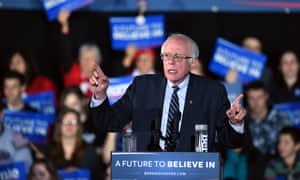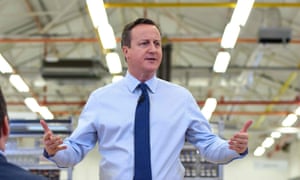Owen Jones in The Guardian
On both sides of the Atlantic, economic insecurity is fuelling the rise of new movements on the left.
Bernie Sanders was neck and neck with Hillary Clinton in this week’s Iowa caucus. Photograph: Yin Bogu/Xinhua Press/Corbis
He’s the septuagenarian powered by youth. The figures behind Bernie Sanders’ triumph in Iowa – in which his grassroots insurgency scored a virtual tie against what he rightly described as “the most powerful political organisation” in the US – are astonishing. Among Iowa Democrats aged between 17 and 29, 84% opted for this unlikely youth icon; among those aged 30-44, Sanders still had a 21-point lead over Hillary Clinton. It was older Americans who flocked to Clinton’s camp: nearly seven out of 10 of those aged over 65. The generations appeared separated by a political chasm.
Here is a phenomenon far from specific to the United States. It is a story of young people facing a present and future defined by economic security, often apparently doomed to a worse lot in life than their parents. They often feel unrepresented, ignored, betrayed or outright attacked by the political elite. They are far more progressive on social issues than their grandparents’ generation. And they are helping to drive movements from Sanders’ to Podemos in Spain, from Syriza to Jeremy Corbyn.
That’s not to exaggerate or oversimplify. A “generation” is itself a sweeping generalisation: it may include the retired white billionaire and the black pensioner shivering in a cold home, or the daughter of a miner and the privately educated young man whose rich parents pay his mortgage deposit. Only a minority of young people are meaningfully politically engaged, let alone politically active, and that includes those who opt for conservative or even far-right parties.
But there’s no question that a swath of disenfranchised youth is powering the new movements of the left. Political attitudes have changed. Labour’s rout last May is often compared to the party’s 1983 disaster; but when Labour was defeated under Michael Foot, the Tories had a nine-point lead among 18- to 24-year-olds, while in 2015, Labour achieved a 16-point lead among 18- to 24-year-olds. What’s more, younger Britons were twice as likely to opt for the leftwing Greens as the rest of the population. While a poll last month found that a derisory 16% of those over the age of 60 think Jeremy Corbyn is doing well, the figure rises to 41% among 18- to 24-year-olds. During the leadership contest that swept Corbyn to power, it’s reported that an influx of relatively young members drove the party’s average age down from 53 to 42.
He’s the septuagenarian powered by youth. The figures behind Bernie Sanders’ triumph in Iowa – in which his grassroots insurgency scored a virtual tie against what he rightly described as “the most powerful political organisation” in the US – are astonishing. Among Iowa Democrats aged between 17 and 29, 84% opted for this unlikely youth icon; among those aged 30-44, Sanders still had a 21-point lead over Hillary Clinton. It was older Americans who flocked to Clinton’s camp: nearly seven out of 10 of those aged over 65. The generations appeared separated by a political chasm.
Here is a phenomenon far from specific to the United States. It is a story of young people facing a present and future defined by economic security, often apparently doomed to a worse lot in life than their parents. They often feel unrepresented, ignored, betrayed or outright attacked by the political elite. They are far more progressive on social issues than their grandparents’ generation. And they are helping to drive movements from Sanders’ to Podemos in Spain, from Syriza to Jeremy Corbyn.
That’s not to exaggerate or oversimplify. A “generation” is itself a sweeping generalisation: it may include the retired white billionaire and the black pensioner shivering in a cold home, or the daughter of a miner and the privately educated young man whose rich parents pay his mortgage deposit. Only a minority of young people are meaningfully politically engaged, let alone politically active, and that includes those who opt for conservative or even far-right parties.
But there’s no question that a swath of disenfranchised youth is powering the new movements of the left. Political attitudes have changed. Labour’s rout last May is often compared to the party’s 1983 disaster; but when Labour was defeated under Michael Foot, the Tories had a nine-point lead among 18- to 24-year-olds, while in 2015, Labour achieved a 16-point lead among 18- to 24-year-olds. What’s more, younger Britons were twice as likely to opt for the leftwing Greens as the rest of the population. While a poll last month found that a derisory 16% of those over the age of 60 think Jeremy Corbyn is doing well, the figure rises to 41% among 18- to 24-year-olds. During the leadership contest that swept Corbyn to power, it’s reported that an influx of relatively young members drove the party’s average age down from 53 to 42.
Is it all just youthful naivete? “In 1984 and 1988,” notes the US journalist Peter Beinart, “young voters backed Ronald Reagan and George HW Bush by large margins,” just as Margaret Thatcher attracted a level of youth support that has eluded David Cameron. The evidence that people become naturally more conservative as they age is not conclusive; indeed, on social issues, older people are often simply keeping the conservative attitudes of their youth. “Change is most often toward increased tolerance rather than increased conservatism,” notes one US study. For older Britons, the left may be associated with the disastrous failure of Soviet totalitarianism and the breakdown of the postwar consensus. For younger Britons, the aftermath of financial collapse and a self-evidently profoundly unequal society may loom larger. It’s the fall of Lehman Brothers, not the Berlin Wall, that may be more significant.
The generations seem to live on different political planets. American youth are far more likely to support immigration than their elders, and to have a positive view of Muslims; and while the over-35s are slightly more likely to believe government does too much, the under-35s are decisively more likely to believe it does too little. Here is a generation that has grown up in a world defined by market failure rather than one shaped by cold war rivalries. As a self-described socialist, Sanders is an exceptionally rare breed of American politician. But it is notable that, while just 15% of Americans over 65 have a positive view of socialism, that rises to 36% among the 18- to 29-year-olds, just three points fewer than those who opt for capitalism.
Yet it is surely economic insecurity that drives today’s young radicalism. A poll last year found that nearly half of so-called “millennial” Americans – those aged 18 to 35 – believed that they faced a “dimmer future than their parents”. Forty million Americans are now saddled with student debt, helping to suppress their living standards and leaving them with less disposable income for, say, a mortgage or a car. Home ownership across the Atlantic – the linchpin of the “American dream” – is now at its lowest level for nearly half a century. The economic recovery is an abstraction for many young Americans, all too often driven into insecure and low-paid occupations with little prospect of rising wages or a standard of living they believe they deserve.
A similar picture could be painted in Britain, of course. Government policies have disproportionately targeted younger people: whether it be the punishing of educational aspiration with the trebling of student fees, the cutting of youth services, the scrapping of the Educational Maintenance Allowance, a minimum wage that discriminates against the young, cuts to youth services or a fall in living standards that older Britons have not had to endure. A young person may find that attending university – which now means accruing a huge pile of debt – does not open doors it once did. Home ownership is at its lowest level for a quarter of a century, and it has particularly plummeted among the young, with evidence that many have given up saving up for a deposit altogether. There are now more private tenants than social tenants, and half of those in an often unregulated private rented sector with what can be income-devouring rents are under 34.
But here is the danger. Like other western nations, Britain is an ageing society, and older voters are both decisively opting for the Conservatives, and turning out to vote in great number. The new movements face a formidable task: to both inspire younger voters to turn out in greater number, and persuade a substantial number of older Britons of their cause. A failure to do so will doom these movements. But the mainstream political elite should not feel complacent. They seem to believe they can abandon the young and face no political consequences. They may find that, one day, they run out of luck.
The generations seem to live on different political planets. American youth are far more likely to support immigration than their elders, and to have a positive view of Muslims; and while the over-35s are slightly more likely to believe government does too much, the under-35s are decisively more likely to believe it does too little. Here is a generation that has grown up in a world defined by market failure rather than one shaped by cold war rivalries. As a self-described socialist, Sanders is an exceptionally rare breed of American politician. But it is notable that, while just 15% of Americans over 65 have a positive view of socialism, that rises to 36% among the 18- to 29-year-olds, just three points fewer than those who opt for capitalism.
Yet it is surely economic insecurity that drives today’s young radicalism. A poll last year found that nearly half of so-called “millennial” Americans – those aged 18 to 35 – believed that they faced a “dimmer future than their parents”. Forty million Americans are now saddled with student debt, helping to suppress their living standards and leaving them with less disposable income for, say, a mortgage or a car. Home ownership across the Atlantic – the linchpin of the “American dream” – is now at its lowest level for nearly half a century. The economic recovery is an abstraction for many young Americans, all too often driven into insecure and low-paid occupations with little prospect of rising wages or a standard of living they believe they deserve.
A similar picture could be painted in Britain, of course. Government policies have disproportionately targeted younger people: whether it be the punishing of educational aspiration with the trebling of student fees, the cutting of youth services, the scrapping of the Educational Maintenance Allowance, a minimum wage that discriminates against the young, cuts to youth services or a fall in living standards that older Britons have not had to endure. A young person may find that attending university – which now means accruing a huge pile of debt – does not open doors it once did. Home ownership is at its lowest level for a quarter of a century, and it has particularly plummeted among the young, with evidence that many have given up saving up for a deposit altogether. There are now more private tenants than social tenants, and half of those in an often unregulated private rented sector with what can be income-devouring rents are under 34.
But here is the danger. Like other western nations, Britain is an ageing society, and older voters are both decisively opting for the Conservatives, and turning out to vote in great number. The new movements face a formidable task: to both inspire younger voters to turn out in greater number, and persuade a substantial number of older Britons of their cause. A failure to do so will doom these movements. But the mainstream political elite should not feel complacent. They seem to believe they can abandon the young and face no political consequences. They may find that, one day, they run out of luck.









